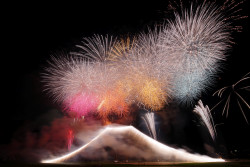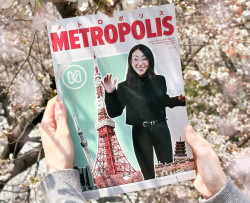
Originally published on metropolis.co.jp on March 2011

Justin Sereni

Courtesy of Origami Productions
When the Tohoku earthquake struck on March 11, many overseas artists happened to be in Tokyo. Numerous concerts, like those by Jack Johnson and Slash, were canceled the following week—often not by choice of the performer but due to safety and blackout issues. Some artists, like R&B heartthrob Ne-yo and ’80s icon Cyndi Lauper, were given the go-ahead, and they devoted their shows to consoling fans and raising funds for the Japanese Red Cross.
Many musicians whose concerts were canceled issued statements of support. “We were in Tokyo when the earthquake hit and we were very frightened,” Emilio Castillo, bandleader for horn combo Tower of Power, told the Blue Note Tokyo. “But our hearts, thoughts and prayers are filled with concern for those affected the most.”
Legendary jazz bassist Ron Carter noted that his career—like those of many others—depends on local fans. “The Japanese jazz fan is the most important supporter of my music, and I am always grateful for the years you have stood by my side,” he said. “As you know, I will be traveling to your Blue Note clubs this coming June. I hope to see you there, and we can try to help your healing process with our music and in any other way possible.”
Tokyo’s diverse community of expat musicians and promoters have been busy finding ways to contribute. French/Italian dubstep DJ and journalist Laurent Fintoni was eating ramen in Kichijoji when the quake hit. Within a week he had put together a compilation download album, Nihon Kizuna (www.nihonkizuna.com), which raised nearly $10,000 for the Red Cross in two days.
“After a few days of soaking in news and feeling helpless, this felt like the only logical thing to do,” he told Metropolis. The compilation includes tracks by local expats like French downtempo stylist Audace. “It was simply a case of asking people to send us a track or something previously released in order to move quickly,” he explained, citing the “crowdsourcing power of the internet” as the secret of his success.
Veteran expat American jazz trumpeter and two-decade Tokyo resident Mike Price will be dedicating an April 15 concert to the victims. “A concert, by comparison [to the quake], seems to be a trivial event,” he says. “But perhaps, we can offer through the music a moment of introspection, a moment of solace to our audience.”
Japanese artists were outdoing themselves to donate funds to the cause, with Ayumi Hamasaki offering ¥30 million and Namie Amuro ¥50 million. Benefit tracks and albums abound, too, such as indie rocker Shugo Tokumaru’s “Open a Bottle,” which is available from Bandcamp (http://tonofon.bandcamp.com). Mercurial composer Ryuichi Sakamoto will be contributing to a compilation of ambient and experimental music being put together by Unseen Music (http://unseen-music.com/nihon), with proceeds going to the Japan Earthquake Relief Fund set up by New York’s Japan Society.
Modish Tokyo jazz-funk/hip-hop label Origami Productions is devoting the earnings of its new album, O2 act.5, to the Japanese Red Cross. The album documents a live set performed in January by Origami artists, including jazz/hip-hop outfit 45 Trio and jazz-funk-fusion group Ovall. Download it from iTunes or access it at http://ori-gami.info. Meanwhile, jazz unit Quasimode is contributing the proceeds of its ongoing nationwide tour, which touches down at WWW in Tokyo on April 22-23, to the effort. The group has been raising an average of ¥100,000 per concert.
Finally, online Japanese music specialist CDJapan (www.cdjapan.co.jp) is donating 2 percent of profits to the Japanese Red Cross, and for clubbers heading out tonight, bayside megaclub Ageha is holding “BPM Japan” (Be Positive by Music Japan), a techno, house and hip-hop blockbuster featuring a slew of leading domestic DJs, with all proceeds again going to the Japanese Red Cross.
Find more quake aid listings at www.metropolis.co.jp/quakeaid.







